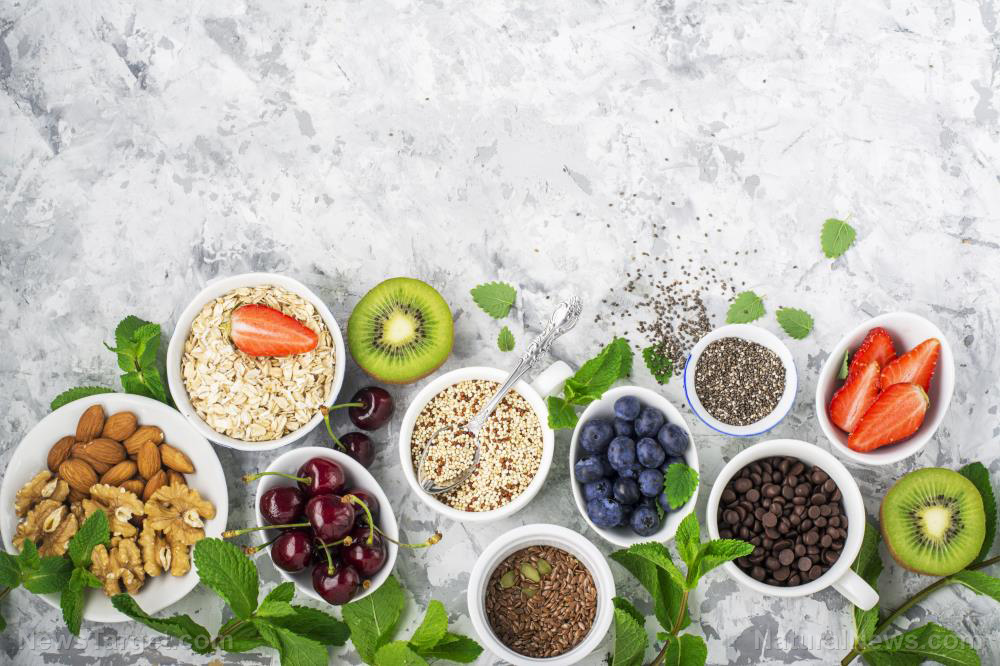Let’s talk about fruits, sugar, and their confusing connection
08/12/2019 / By Rex Carter

Most people know that fruit is nutritious, but is it a good choice for those who are trying to lose weight? It’s not something that everyone agrees on: Some believe that most fruits are loaded with sugar – which, of course, is not good when you’re trying to slim down. That said, the effect of sugar on your health depends on what kind and how much you consume.
The dose makes the poison
Paracelsus, one of the first modern medical professors, said: “The dose makes the poison.” This also applies to sugar. At its most basic, your body breaks down the food you eat into glucose (also known as blood sugar) and other simple sugars. The body then uses these for energy.
Of course, that’s not to say that all types of sugar benefit the body. For one, having excess amounts of sugar in your body is harmful and is often a precursor to chronic diseases. Fructose, in particular, is a type of sugar that’s often misunderstood – since it’s found in fruit and is often seen on ingredient labels as an added sugar.
Indeed, fruit does contain fructose, but it also contains vitamins, minerals, and phytochemicals that provide nutrition. Most fruits are also loaded with fiber and water, which help with portion control.
However, when fructose is found in added sugars like high fructose corn syrup, it’s a different story. For one, it stands out from other sugars since the body cannot utilize it directly. The liver converts fructose to glucose first, so it can be used by the body as a source of energy. When the body gets too much of it and too quickly – like in the case of sweet juices and soda – the liver gets overloaded and instead converts fructose to fat, causing non-alcoholic fatty liver disease.
This has led to some diet purists claiming that fruit, by virtue of its fructose content, is harmful as well. This claim is inaccurate, however, as it’s not the sugar itself that’s bad, but the amount. Adding sweeteners to your diet, however, can lead to excessive fructose consumption, which can lead to the following effects.
- An imbalance in your blood lipid profile by raising VLDL (very low-density lipoprotein) levels, also known as “bad cholesterol.” This leads to fat deposition in the organs, particularly the heart, and makes you a candidate for cardiovascular disease;
- Increased insulin resistance which in turn increases risk of Type 2 diabetes;
- Increased leptin resistance, the hormone that regulates satiety, which effects how body fat is stored and causes you to overeat;
- Increased risk of colorectal cancer by accelerating the growth of tumors; and
- Increased levels of uric acid in the blood, leading to hypertension and gout.
The positive effects of eating fruit
Aside from fructose, most fruits are also loaded with important nutrients which can help the body feel fuller for longer and prevent cell damage.
Vitamins and minerals
Many fruits possess a lot of vitamins and minerals that you may otherwise overlook in your diet, and it’s easy to get these nutrients from fruit because “nature’s fast food” can be eaten as snacks or while you’re on the go. Most fruit, especially those eaten with the skin, are rich in vitamin C and antioxidants, which help prevent premature cell aging and damage. Fruit is also a great source of vitamin A, which helps protect your eyesight from age-related decline. You can also find electrolytes like potassium and magnesium — minerals that facilitate the functions of the nervous system — in most fruit. Folate, also called vitamin B9, is also present in citrus fruits. A large orange, for example, contains up to 55 micrograms or 14 percent of the recommended daily intake.
Fiber
Most fruit is packed with fiber and water, so you take time to eat and digest it. As a consequence, foods rich in fiber make you feel fuller for longer. By contrast, processed foods and sweets contain similar or higher amounts of fructose but have less nutritional value and satiety. Moreover, insoluble fiber maintains regular bowel movement, while soluble fiber plays a role in weight management, cholesterol regulation, and blood sugar stability. (Related: Learn which carbs are actually good for you in moderate amounts.)
Adding a variety of fruit to your diet is always a great idea. While many may contain sugar, the benefits far outweigh whatever negatives the fructose content brings.
Sources include:
Submit a correction >>
Tagged Under:
This article may contain statements that reflect the opinion of the author
RECENT NEWS & ARTICLES
COPYRIGHT © 2017 SUPER FOODS NEWS





















